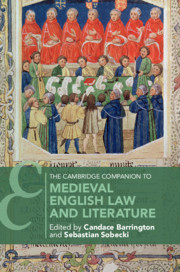Book contents
- The Cambridge Companion to Medieval English Law and Literature
- The Cambridge Companion to Medieval English Law and Literature
- Copyright page
- Contents
- Illustrations
- Contributors
- Abbreviations
- Preface
- Part I Legal Contexts
- Part II Literary Texts
- 7 Treason
- 8 Complaint Literature
- 9 Political Literature and Political Law
- 10 William Langland
- 11 Geoffrey Chaucer
- 12 John Gower
- 13 Lollards and Religious Writings
- 14 Lancastrian Literature
- 15 Middle English Romance and Malory’s Morte Darthur
- 16 Marriage and the Legal Culture of Witnessing
- Index
- References
12 - John Gower
from Part II - Literary Texts
Published online by Cambridge University Press: 26 July 2019
- The Cambridge Companion to Medieval English Law and Literature
- The Cambridge Companion to Medieval English Law and Literature
- Copyright page
- Contents
- Illustrations
- Contributors
- Abbreviations
- Preface
- Part I Legal Contexts
- Part II Literary Texts
- 7 Treason
- 8 Complaint Literature
- 9 Political Literature and Political Law
- 10 William Langland
- 11 Geoffrey Chaucer
- 12 John Gower
- 13 Lollards and Religious Writings
- 14 Lancastrian Literature
- 15 Middle English Romance and Malory’s Morte Darthur
- 16 Marriage and the Legal Culture of Witnessing
- Index
- References
Summary
Conventional wisdom holds 1330 to be the year the English poet John Gower was born, following a line of speculation that he was older than his friend and fellow poet Geoffrey Chaucer, whose birth traditionally has been assigned to 1340. No contemporary records are known to exist to confirm either date, for either man, however – and as is not the case with Chaucer, no accounts at all have surfaced to shed light on Gower’s early life. Lacking firm evidence to the contrary, and for a variety of circumstantial reasons, his birthdate is perhaps better set a bit later, between 1335 and 1340. Most likely John Gower hailed from armigerous gentry, with lands in Kent. His father – or more plausibly, the poet’s uncle – may have been one Sir Robert Gower (d. 1349), buried in Brabourne, south-east Kent – a township where John Gower also owned property, at least in his later years. Armorial blazons on a manuscript of Gower’s Latin poems Vox Clamantis and Cronica Tripertita match both one on the poet’s tomb, preserved in Southwark Cathedral, and those of Sir Robert Gower; another indication of the poet’s Kentish origins are the many Kentish dialectal elements present in the language of his English poetry. If Sir Robert Gower was indeed John Gower’s father, the family also possessed properties in Suffolk and East Anglia along with Kent, and probably had landed relations in Yorkshire as well.
- Type
- Chapter
- Information
- The Cambridge Companion to Medieval English Law and Literature , pp. 147 - 165Publisher: Cambridge University PressPrint publication year: 2019



